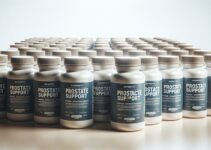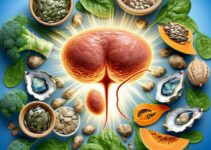You might think prostate enlargement is an unavoidable part of aging, but what if I told you that there are nine key vitamins that can potentially help prevent it? These vitamins play a crucial role in supporting prostate health and could be the missing piece in your wellness routine. By incorporating these essential nutrients into your diet, you might just find the solution you've been searching for to support your prostate health.
Key Takeaways
- Adequate levels of Vitamin D, Vitamin E, Vitamin C, Vitamin B6, and Vitamin K2 can help reduce the risk of prostate enlargement.
- Sun exposure is a natural way to obtain Vitamin D, but Vitamin D supplements can also be used.
- Vitamin E is a powerful antioxidant that protects cells from damage and can be obtained through diet or supplementation.
- Vitamin C has antioxidant properties that protect the prostate gland and can be found in citrus fruits and bell peppers.
Vitamin D
You can maintain healthy prostate function by ensuring you get enough Vitamin D through sunlight exposure or supplementation. Sun exposure is a natural way for your body to produce Vitamin D, which is essential for prostate health. Research suggests that adequate levels of Vitamin D may help reduce the risk of prostate enlargement. However, if getting enough sunlight is a challenge, Vitamin D supplements can be a reliable alternative to support your prostate health. Studies have shown that men with lower levels of Vitamin D are more likely to experience prostate enlargement, making it crucial to monitor your Vitamin D intake.
To promote prostate health, aim for at least 15 minutes of sunlight exposure a few times per week, allowing your body to naturally produce Vitamin D. Additionally, consider incorporating Vitamin D-rich foods into your diet, such as fatty fish, cheese, and egg yolks. If sunlight exposure is limited or if you have difficulty obtaining Vitamin D through diet alone, consult with your healthcare provider about the potential benefits of Vitamin D supplementation in preventing prostate enlargement.
Vitamin E
Vitamin E plays a crucial role in supporting overall prostate health and may contribute to preventing prostate enlargement. This essential vitamin is a powerful antioxidant that helps to protect cells from damage caused by free radicals. Incorporating vitamin E into your diet or through supplements can provide several benefits for prostate health. However, it's important to be mindful of the recommended dosage and potential side effects when considering vitamin E supplementation.
| Benefits of Vitamin E | Dosage |
|---|---|
| Antioxidant properties | 15mg per day |
| Anti-inflammatory effects | Up to 1,000mg per day |
| Cell protection | |
| Supports prostate health | |
When it comes to vitamin E supplements, it's crucial to follow the recommended dosage to avoid adverse effects. Excessive intake of vitamin E supplements can lead to side effects such as nausea, diarrhea, and an increased risk of bleeding. As with any supplementation, it's essential to consult with a healthcare professional to determine the appropriate dosage and to discuss any potential risks, especially if you have existing health conditions or are taking medications.
Vitamin C
After considering the role of Vitamin E in supporting overall prostate health, it is essential to now focus on Vitamin C and its potential impact on prostate enlargement prevention. Vitamin C, also known as ascorbic acid, is renowned for its antioxidant properties, which are crucial for combating oxidative stress and inflammation in the body. These properties are particularly beneficial for prostate health as they help to protect the prostate gland from damage caused by free radicals.
Moreover, Vitamin C plays a vital role in collagen production. Collagen is a structural protein that provides strength and support to various tissues in the body, including the prostate gland. By promoting collagen synthesis, Vitamin C contributes to the maintenance of healthy prostate tissue and may help prevent the development of prostate enlargement.
Incorporating Vitamin C-rich foods such as citrus fruits, strawberries, bell peppers, and broccoli into your diet can be an effective way to ensure an adequate intake of this essential vitamin. Additionally, considering Vitamin C supplementation under the guidance of a healthcare professional may be beneficial for individuals who have difficulty meeting their vitamin C needs through diet alone.
Vitamin B6
Considering the vital role that Vitamin B6 plays in supporting overall prostate health, it is essential to understand its impact on preventing prostate enlargement. Vitamin B6, also known as pyridoxine, is crucial for maintaining the health of the prostate gland. Here are some key points to consider:
- Vitamin B6 benefits, dosage
- Vitamin B6 aids in the regulation of hormones, including reducing dihydrotestosterone (DHT) levels, which can contribute to prostate enlargement.
- The recommended daily allowance of Vitamin B6 for adult men is 1.3-1.7 mg per day. However, higher doses may be recommended for specific health concerns, including prostate health.
- Vitamin B6 and prostate health
- Studies have shown that adequate levels of Vitamin B6 in the body may help reduce the risk of developing benign prostatic hyperplasia (BPH), a common condition in aging men characterized by prostate enlargement.
- Vitamin B6 is involved in the synthesis of neurotransmitters and has anti-inflammatory properties, which can contribute to maintaining a healthy prostate.
Ensuring that you meet the recommended daily intake of Vitamin B6 through a balanced diet or supplementation can potentially aid in preventing prostate enlargement and supporting overall prostate health.
Vitamin K2
Vitamin K2 plays a crucial role in maintaining prostate health. It has been linked to reducing the risk of prostate enlargement and promoting overall prostate wellness. Consuming foods rich in Vitamin K2 and meeting the recommended daily intake can help support a healthy prostate.
Benefits of Vitamin K2
To promote prostate health and prevent enlargement, incorporating Vitamin K2 into your daily diet has been shown to offer significant benefits. Research findings have indicated that Vitamin K2 plays a crucial role in preventing calcium from accumulating in the arteries, which can contribute to cardiovascular issues. Additionally, Vitamin K2 has been linked to supporting bone health by ensuring calcium is properly utilized, reducing the risk of osteoporosis. Furthermore, incorporating Vitamin K2 into your diet can help improve insulin sensitivity, potentially reducing the risk of type 2 diabetes. Sources of Vitamin K2 include fermented foods like natto, sauerkraut, and certain cheeses, as well as animal products such as egg yolks and liver. By including these sources in your diet, you can harness the health benefits of Vitamin K2 and support overall well-being.
Food Sources of K2
You can find Vitamin K2 in various food sources, including fermented foods like natto, sauerkraut, and certain cheeses, as well as animal products such as egg yolks and liver. Consuming these foods can provide you with the benefits of K2, which include supporting bone health, cardiovascular function, and potentially reducing the risk of prostate enlargement. Natto, a traditional Japanese dish made from fermented soybeans, is particularly rich in K2. Additionally, certain cheeses like Gouda and Brie contain K2, making them a good dietary source. Egg yolks and liver from pasture-raised animals also provide K2. While obtaining K2 from food sources is beneficial, for some individuals, K2 supplementation may be necessary to ensure adequate intake, especially for those who have limited access to these specific food items.
Recommended Daily Intake
Ensuring an adequate daily intake of Vitamin K2 is essential for supporting overall health and may require consideration of dietary sources and potential supplementation. The recommended daily intake of Vitamin K2 for adult men is 120 micrograms. This can be obtained through various dietary sources such as fermented foods like natto, cheese, and egg yolks. However, it can be challenging to consume enough Vitamin K2 through diet alone, making supplementation a convenient option. It's important to consult with a healthcare professional before starting any supplementation, as excessive intake of Vitamin K2 may lead to potential side effects such as interference with certain medications or blood clotting issues.
- Recommended daily intake of Vitamin K2 for adult men: 120 micrograms
- Dietary sources include fermented foods like natto, cheese, and egg yolks
- Consult with a healthcare professional before considering supplementation
Vitamin A
Maintaining adequate levels of Vitamin A is essential for supporting prostate health and preventing enlargement. This crucial vitamin plays a vital role in promoting the overall well-being of the prostate. Vitamin A is known for its antioxidant properties, which help in reducing inflammation and protecting the prostate from oxidative stress. It also aids in preventing the enlargement of the prostate gland, which can lead to various urinary problems.
Consuming Vitamin A rich foods such as sweet potatoes, carrots, spinach, and liver can contribute to the maintenance of healthy levels of this essential nutrient. These foods not only provide Vitamin A but also offer a wide array of other nutrients beneficial for prostate health.
Research has shown that Vitamin A may help inhibit the growth of prostate cancer cells and reduce the risk of developing prostate cancer. However, it is important to consume this vitamin in appropriate amounts, as excessive intake can lead to adverse effects. It is advisable to consult a healthcare professional to determine the right dosage and ensure that your intake of Vitamin A is contributing positively to your prostate health.
Zinc
You need to understand the importance of zinc in preventing prostate enlargement. This essential mineral plays a crucial role in maintaining prostate health and function. Knowing the dietary sources and recommended daily intake of zinc is essential for promoting your overall prostate health.
Importance of Zinc
Zinc plays a crucial role in supporting prostate health and function. It is essential for the proper absorption of key nutrients, including vitamin E, which is known for its prostate health benefits. Moreover, zinc acts as an antioxidant, protecting prostate cells from oxidative damage and inflammation. Zinc deficiency has been linked to an increased risk of prostate enlargement and other prostate-related issues. Ensuring an adequate intake of zinc is crucial for maintaining optimal prostate health.
- Zinc Absorption: Zinc is necessary for the absorption of essential nutrients crucial for prostate health, such as vitamin E.
- Antioxidant Protection: Zinc serves as an antioxidant, shielding prostate cells from oxidative damage and inflammation.
- Deficiency Risks: Inadequate zinc levels have been associated with an elevated risk of prostate enlargement and related health concerns.
Dietary Sources
Rich dietary sources of zinc include lean meats, poultry, seafood, dairy products, and nuts. These foods are crucial for maintaining prostate health. Meeting nutritional recommendations for zinc is essential as it plays a vital role in prostate function. Research suggests that zinc deficiency may contribute to prostate enlargement, making it crucial to incorporate zinc-rich foods into your diet. Lean meats such as beef, pork, and lamb are particularly high in zinc, making them valuable additions to support prostate health. Additionally, incorporating poultry like chicken and turkey, seafood such as oysters and crab, dairy products like cheese and milk, and nuts like almonds and cashews can help ensure you are meeting your body's zinc needs. Prioritizing these dietary sources can significantly contribute to maintaining optimal prostate health.
Recommended Daily Intake
Maintaining an adequate daily intake of zinc is crucial for supporting optimal prostate health and function. The recommended daily intake of zinc for adult males is 11 mg. It is important to ensure that your diet includes zinc-rich foods or consider supplementation to meet this requirement.
Recommended Daily Intake of Zinc:
- Adult males: 11 mg
- Dietary sources rich in zinc include oysters, beef, poultry, dairy, and nuts.
- Consider zinc supplements if dietary intake is insufficient.
Ensuring that you meet the recommended daily intake of zinc is essential for supporting prostate health and preventing prostate enlargement. By incorporating zinc-rich foods or supplements into your daily routine, you can help maintain the necessary nutrient requirements for overall prostate health.
Selenium
To support prostate health, ensure that your diet includes adequate levels of selenium, a crucial mineral that plays a key role in preventing prostate enlargement. Selenium benefits the prostate by acting as an antioxidant, protecting the gland from oxidative stress and inflammation. Studies have shown that selenium-rich foods can help reduce the risk of prostate enlargement and lower the likelihood of developing prostate-related issues. Incorporating foods such as brazil nuts, seafood (like oysters, tuna, and shrimp), sunflower seeds, and whole grains into your diet can provide the necessary selenium levels to support your prostate health.
Selenium works by inhibiting the growth of prostate cells and reducing inflammation, which are key factors in preventing prostate enlargement. It also plays a role in supporting the body's immune function, which is important for overall prostate health. However, it's important to note that while selenium is essential for prostate health, excessive intake can be harmful. Therefore, it's crucial to maintain a balanced diet and consult with a healthcare professional to determine the appropriate selenium intake for your specific needs.
Lycopene
Incorporate tomatoes and tomato-based products into your diet to benefit from the potent antioxidant properties of lycopene, which can support prostate health and help prevent enlargement. Lycopene, a carotenoid found in red fruits and vegetables, has been associated with numerous health benefits, particularly in regards to prostate health. Here are some ways to incorporate lycopene into your diet:
- Tomatoes: Fresh tomatoes, tomato sauce, and tomato juice are rich sources of lycopene. Cooking tomatoes actually increases the bioavailability of lycopene, making it easier for the body to absorb.
- Watermelon: This refreshing fruit is not only delicious but also a great source of lycopene. Enjoy it as a snack or add it to fruit salads for a lycopene boost.
- Guava: This tropical fruit is another excellent source of lycopene. It can be eaten on its own or used in smoothies and desserts to increase your lycopene intake.
When it comes to lycopene supplements, it's essential to consult with a healthcare professional before adding them to your routine. While lycopene supplements are available, getting lycopene from natural food sources is generally recommended due to the added benefits of other nutrients present in these foods.
Frequently Asked Questions
Can Taking These Vitamins and Minerals Actually Shrink an Already Enlarged Prostate, or Are They Only Effective for Prevention?
You may wonder if these vitamins and minerals can actually shrink an already enlarged prostate. Clinical studies show their effectiveness for treatment is inconclusive. More research is needed to determine their impact on an enlarged prostate.
Are There Any Potential Risks or Side Effects Associated With Taking These Vitamins and Minerals for Prostate Health?
Taking these vitamins and minerals for prostate health may pose potential risks and side effects. Their effectiveness for treatment is uncertain. Consult a healthcare professional to assess dietary sources and potential medication interactions.
How Long Does It Typically Take to See Results From Taking These Vitamins and Minerals for Prostate Health?
It usually takes a few months to see noticeable improvements in prostate health when taking these vitamins and minerals. Consistent use is key for effectiveness timeline. You should experience prostate health improvement with regular intake.
Are There Any Foods That Are Particularly High in These Vitamins and Minerals That Can Be Incorporated Into a Diet for Prostate Health?
Incorporate foods high in key vitamins and minerals for prostate health into your diet. Consider options like salmon, broccoli, and almonds to support prevention of an enlarged prostate. Be mindful of potential risks and interactions with medication.
Can These Vitamins and Minerals Interact With Any Medications Commonly Used to Treat Prostate Enlargement or Other Health Conditions?
When it comes to interactions with medications commonly used for prostate treatment, it's important to consider how these vitamins and minerals may impact their effectiveness. Always consult with your healthcare provider to ensure safety.


